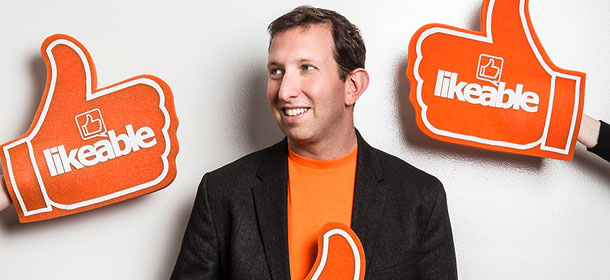9 Questions with Social Media Guru Dave Kerpen: “The internet doesn’t forget”
The author, speaker and entrepreneur shares social media tips, predictions for the future of livestreaming (900 people watched him walk to work this morning) and the story behind his sponsored wedding.
JR Lisk, Inc.: The Content Creation and Strategy Specialists
Dave Kerpen is chairman and co-founder of Likeable Media, an award-winning social media and word-of-mouth marketing agency, and founder and CEO of Likeable Local, a social media software company serving thousands of small businesses. He’s been featured in countless media outlets and keynoted at conferences across the globe. Dave is also a New York Times bestselling author currently working on his fourth book. Check one out! If you don’t like it, he’ll refund you. (See question 3 to learn why this is an effective marketing tactic.)
- Why is it so important for businesses to be active on social media?
This is where the people are. This is where your customers, employees, prospects and competitors’ customers are. Not being on social media would be like all of your customers and prospects going to this party, and you thinking you don’t want to go. There isn’t a business on the planet that wouldn’t benefit from a social media presence.
- Is it important for CEOs to personally embrace social media, or can they get away with delegating all social tasks?
It’s really important for CEOs to personally use social media. Without doing so, it’s harder to truly understand the landscape. To use an analogy, if you were going to try to build a significant business in France but never go to France or speak French, it would be really hard! Similarly with social media, you have to practice it personally to have a true understanding. This is such a huge paradigm switch—the transition from a one-way to a two-way dialogue. It requires immerging to really do it well.
- Some companies are hesitant to embrace social media because they are fearful of negative commentary. What advice can you offer for managing this type of feedback?
Negative commentary is going to happen whether you’re in social media or not. If people download Likeable software and don’t like it, they are going to complain. I can either join the conversation, listen and respond, or I can ignore it completely, hide in the corner and hope it goes away. But it is not going to go away if I ignore it and hide in the corner. The proactive business embraces that there may be negative things said about them and uses it as an opportunity. I like to say that every mistake is an opportunity for surprise and delight, and every complaint is an opportunity to learn and grow.
I respond to all my one-star reviews on Amazon.com. I apologize and offer to send them their money back, plus $50 for their time. It is pretty cool because lots of people respond to my comments saying things like, “Wow, I’m going to buy this book because he practices what he preaches and I can tell he cares. When you respond to a complaint, you are not doing it for the complainer, you are doing it for everyone else in the world who is watching. The internet doesn’t forget. When people find the complaint, do you want them to see that no one responded, or that you are the kind of business that cares about its customers and tries to fix problems?
- You have an impressive following on Twitter. How did you build it? What tips can you offer companies and/or individuals looking to grow their Twitter following?
Twitter is fun because there is no such thing as too much. You can pretty much share all day and night, and I am a big sharer. I like to share my own content and other people’s content, and that helped build my audience. Also, I was a real early user. That might not translate to twitter these days, but it will translate to other new platforms. Right now there is a huge land grab with livestreaming. If you can be really active on Periscope or Meerkat, you can build up your audience and be one of the top people or businesses on those platforms. I watched this little pizzeria owner in Toronto have 1500 people watching him make pizza. He happened to have been an early mover.
- Why do you think Meerkat and Periscope have earned so much attention? Is it warranted?
Meerkat and Periscope have really been the first apps to combine livestreaming with the mobile phone and social distribution. They have made livestreaming more accessible than ever before. It is a really big deal. Saturday night, the Mayweather/Pacquiao fight—lots of people bought it, but lots of people watched livestreams of it, as well. I am excited about livestreaming. I believe it is going to do to television what blogging did to newspapers, which is change it significantly over time. There are still newspapers in business, but there are a lot more blogs, and the leading newspapers are really blogs – online versions of the newspapers. Similarly, you are going to see livestreaming emerge as a platform to create video content and compete with television. You have an opportunity as a business or personal brand to create and bring content directly to people without the intermediary of the television set. I had 900 people watch me walk from the train station to work this morning!
- Isn’t that weird?
On the one hand, it’s weird. On the other hand, for someone who doesn’t live in the city to see the big crowds and the largest Macy’s in the world, it’s pretty cool. It is all about creating compelling content.
- Visual content has become increasingly popular and important. What tips can you provide for small businesses who have limited resources for content creation?
I am hugely biased, but we have a free tool called Likeable Hub that allows you to have access to thousands of visual ideas and posts. Our other free product is freeideaoftheday.com. Also, don’t be afraid to take pictures from your phone and create visual content that way.
- We have to ask about your sponsored wedding. What inspired the idea? Do you think it’s something other couples should try?
Funny you ask! It was nine years ago, but I’m still asked about it a lot. We wanted a huge wedding, but we couldn’t afford it. We both had a sales and marketing background. My wife had the idea to get married at a baseball game and create a sponsored promotion. We pitched it to the Brooklyn Cyclones and they liked the idea, so we were able to resell the sponsorship inventory from the game to our wedding partners. It was awesome. We raised $100,000 in goods and services for the wedding and $20,000 for charity for the MS Society. To this day, I get requests from couples, mainly brides, wondering how we did it. For a while it was once a month, now it is probably every two to three months. It’s really hard, and it has not been replicated. The creative in me loves that, but the entrepreneur in me doesn’t because I like to build scalable stuff. This wasn’t really scalable or repeatable. You need a couple that is good at sales and marketing and is willing to create real value for the sponsors. Our sponsors got great value out of our wedding. They were in front of 8,000 people at a baseball game. You have to think about what value you are going to create for your sponsors. That’s the key issue a lot of brides and grooms have trouble with.
- And lastly, we can’t wait for your closing keynote at the upcoming Westchester Digital Summit. What can we expect?
I’m going to attempt to do something very challenging—make people both laugh and cry.
Will he do it? Join us on May 14, where Dave will be teaching attendees Why it Pays to be Likeable. Register Now!

JR Lisk, Inc.: The Content Creation and Strategy Specialists
M: +1 914-325-2152
T: @JLisk1



